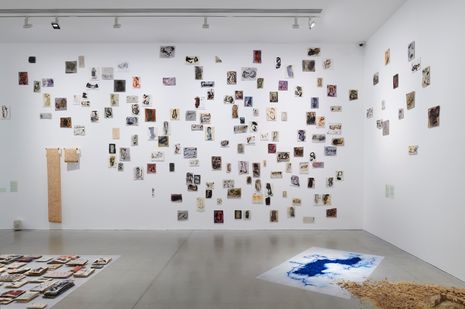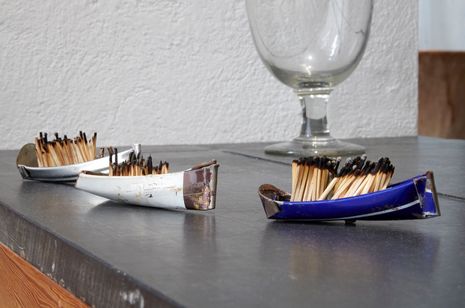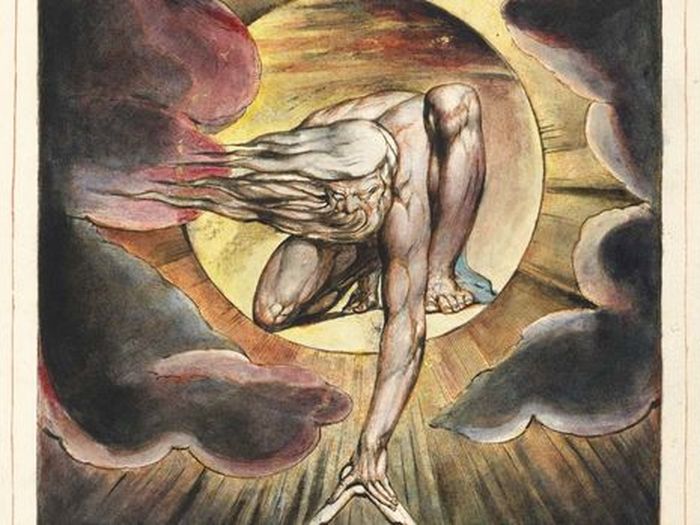‘Urgent Archive’: Issam Kourbaj
Saranka Maheswaran reviews the compelling new exhibition at Kettle’s Yard by Christ’s College educator and artist, Issam Kourbaj

Seeds, TVs, and poetry are just a few of the motifs that are married together in Issam Kourbaj’s latest exhibition at Kettle’s Yard, ‘Urgent Archives.’ Kourbaj explained that the title of the exhibition may sound contradictory, given that archives traditionally preserve the old and are not necessarily considered a pressing matter in times of crisis, as in Syria and Gaza. Yet the exhibition subverts this viewpoint, instead highlighting the resistance inherent to archiving and visually commemorating the destruction occurring.
Kourbaj has lived in Cambridge since 1990, producing work documenting the events in Syria as they occur, as well as teaching at Christ’s College between 2007 and 2011. His work as an educator and his deeply collaborative nature reverberate in ‘Urgent Archives’. He explained to me how, when he was asked to teach as a bye-fellow at Christ’s college, it was his students who helped his English. Previously, he has worked with his son Mourad, aged 3, to create ‘is/am.’
“Seeds are a metaphor for fleeing migrants who are attempting to flee the dark for the light”
This new exhibition is no different. Kourbaj works with not only Kettle’s Yard, but also the Sainsbury Laboratory to actualise his vision with the use of seeds. Seeds are a metaphor for fleeing migrants who are attempting to flee the dark for the light, just as seeds emerge from the soil into light. However, they work beyond pure metaphor, in this case directly referencing the bomb attack on Aleppo’s seed bank in 2015. Working with the laboratory, Kourbaj is growing Syrian wheat outside Kettle’s Yard with the help of Cambridge University Botanic Gardens, as well as at the Royal Botanic Gardens in Kew.
‘Urgent Archives’ is also being run concurrently with Kourbaj’s exhibition at the Heong Gallery, ‘You are not you and home is not home.’ Both exhibitions are enriched by their multiple locations of display, actively engaging the viewer to understand the migratory experiences of refugees with greater depth.

While ‘Urgent Archives’ is still on display, Kourbaj will be returning and constantly adding to it. By adding and altering elements throughout the exhibition, he is also able to highlight the significance of accessing the constantly changing situations in Syria and Gaza. Although the devastation occurring is not always effectively published by mainstream channels, the exhibition entreats us to actively seek out information. As part of the ‘Action/Time/Performance’ room, there is a computer that has a link to the Facebook page of a news outlet that provides constant updates as to what is happening in Syria.
“There is a direct urge to face not only our privilege but also to be ever aware of the severe distress refugees face”
Time is harnessed further by involving the site of Kettle’s Yard, Jim and Helene Ede’s former home. Within the home, some miniature boats have been placed with matchsticks as part of ‘Dark Water, Burning World’ (2016), a constant reminder of the immense danger refugees are forced to face as their only alternative. By placing them in the comfort of the house, there is a direct urge to face not only our privilege but also to be ever aware of the severe distress refugees face. This importance of awareness is extended in the ‘Killed, detained and missing (women)’ (2019) piece created with ink on pianola scrolls found in the exhibition. There is a permanent reminder of the brutality being faced by women in Syria, which passersby are rendered aware of as the exhibition continues on the Castle Street window. By being on display to all those passing by on their day-to-day routines, there is again an active disruption of public space encouraging awareness.
It is not easy work; Kourbaj’s art embodies and expresses a “painful distance”. “It is not a joyous thing … but this is the only thing I can do”. Kourbaj’s keen attention to current events combines with rich metaphors of migration and growth throughout the exhibition, “activating artwork” in an essential and innovative way. He explained how he often returns to the exhibitions at Kettle’s Yard about three times, unveiling and understanding the art in new ways each time —with the constantly changing nature of ‘Urgent Archives’, he encourages viewers to come again and again.
Issam Kourbaj’s ‘Urgent Archives’ was curated by Guy Haywood and Amy Tobin, and will be on display from 2nd March until 26th May.
 News / Judge Business School advisor resigns over Epstein and Andrew links18 February 2026
News / Judge Business School advisor resigns over Epstein and Andrew links18 February 2026 News / Gov grants £36m to Cambridge supercomputer17 February 2026
News / Gov grants £36m to Cambridge supercomputer17 February 2026 News / Hundreds of Cambridge academics demand vote on fate of vet course20 February 2026
News / Hundreds of Cambridge academics demand vote on fate of vet course20 February 2026 News / CUCA members attend Reform rally in London20 February 2026
News / CUCA members attend Reform rally in London20 February 2026 News / Union speakers condemn ‘hateful’ Katie Hopkins speech14 February 2026
News / Union speakers condemn ‘hateful’ Katie Hopkins speech14 February 2026










